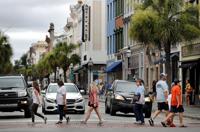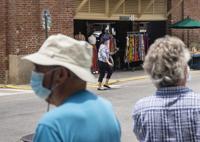As coronavirus case numbers continue to rise in South Carolina, travelers may be starting to think twice about summer trips to the Palmetto State.
During a press conference with Gov. Henry McMaster Friday afternoon, state tourism director Duane Parrish said the rise in cases is "certainly" affecting travel demand.
"The recent national publicity around cases has hurt our industry’s comeback," Parrish said.
Some hotels and resorts are fielding cancellations from concerned travelers. And for the first time since visitors slowly started returning, statewide hotel occupancy took a dip during the July 4 holiday weekend.
"I think it absolutely shows the increase in COVID-19 is having an impact on people visiting," Explore Charleston CEO Helen Hill said this week.
She described this as a "critical" time, stressing the importance of mask-wearing and social distancing in keeping this year's muted summer travel season going.
About 52 percent of the state's hotel rooms were occupied during the week ending July 4, down 5 percent from the previous week. In the Charleston area, occupancy was down by a slightly smaller margin of 3 percent.
It's actually not uncommon for the region's hotels to be a little less full the week of Independence Day, said Daniel Guttentag, who heads the Office of Tourism Analysis at the College of Charleston. That's even true during past years when the holiday fell on a weekend, he said.
More weeks of declining hotel figures would be needed to indicate that the drop is connected to the state's coronavirus case numbers, he said.
"If we see a more consistent decline, it would be almost undeniable that it is tied to the rise in cases," Guttentag said.
But even if occupancy ticked back up the next week — tourism officials will get those numbers this Wednesday — it will still be true that figures are "trailing significantly" behind pre-pandemic levels, he said. In July 2019, for example, hotels statewide filled 73 percent of their rooms.
Myrtle Beach, which of all of South Carolina's major tourism markets has seen the highest occupancy rates since the state started to reopen, did see its weekend rates drop off one week sooner than the state as a whole.
For the weekend of June 26, about 82 percent of the Grand Strand city's hotel rooms were occupied, down from 87 percent the previous week. The first reports of coronavirus case clusters linked to Myrtle Beach trips had come out about a week prior.
Health officials in West Virginia were the first to point to Myrtle Beach as the source of COVID-19 cases in their state. Ohio, Kentucky and Virginia named the beach city as the source of outbreaks in their states just days later. Most recently, Gov. Phil Murphy of New Jersey wrote on Twitter last Monday that "several cases" there were tied to a Myrtle Beach wedding.
Myrtle Beach hotel occupancy dipped again the weekend of July 4, dropping below 80 percent for the first weekend since late May.
Changing interests in Palmetto State travel may also be indicated in online habits, according to a new analysis from McKinsey & Company and the hotel price tracking site Trivago. The report drew connections between online clicks and COVID-19 case numbers.
By evaluating searches and booking queries and measuring "click-outs" — instances when a user actually clicked on a selected offer — the McKinsey analysts found that click-outs for South Carolina and other states with rising cases, like Arizona and Florida, decreased between 30 percent and 53 percent compared to mid-June.
"hotel" - Google News
July 11, 2020 at 07:00PM
https://ift.tt/3iPlLQK
SC seeing hotel cancellations, drop in occupancy as COVID-19 cases grow - Charleston Post Courier
"hotel" - Google News
https://ift.tt/3aTFdGH
https://ift.tt/2xwvOre
Bagikan Berita Ini
















0 Response to "SC seeing hotel cancellations, drop in occupancy as COVID-19 cases grow - Charleston Post Courier"
Post a Comment